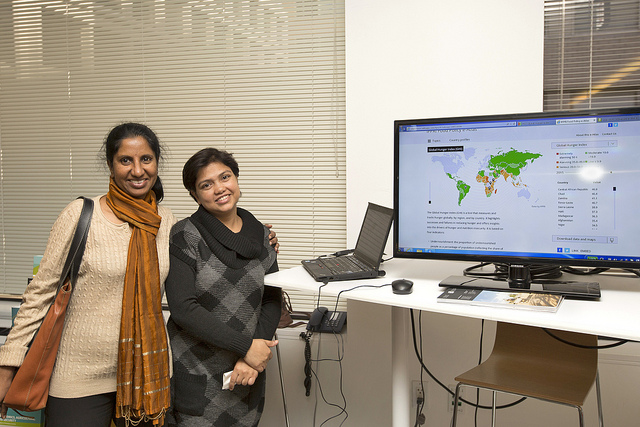The Global Open Data for Agriculture & Nutrition (GODAN) Summit is underway Sept. 15 and 16 in New York. GODAN is a rapidly growing group with 350 partners, including IFPRI, promoting collaboration to harness the growing volume of data to solve long-standing problems and to benefit farmers and the health of consumers. On Sept. 15, IFPRI, the U.S. Department of Agriculture, and Syngenta are hosting a side-event called Precision Agriculture to assess how open data can enable emerging precision agriculture technologies across developed and developing regions.
Since its inception, IFPRI has been at the forefront of providing open-access datasets, economic models, and web-based policy information that have improved how policy options are understood, discussed, and implemented. Few examples of the public goods IFPRI has contributed include:
- International Model for Policy Analysis of Agricultural Commodities and Trade (IMPACT). IMPACT is one of the most groundbreaking economic models IFPRI has developed. IMPACT’s publicly available data presents decision-makers with alternative future scenarios regarding global food supply, demand, trade, prices, and food security to help guide their policy or investment decisions. IMPACT has generated a demand for analyses and projections from a number of organizations and has been used in advocacy and preparation of policy briefs for ministers in developing countries, according to an independent assessment.
- HarvestChoice. Identifying which agricultural investments have the greatest impact depends on reliable data and analysis. HarvestChoice generates knowledge products, including geospatial tools, maps, analytics, and publications, to help guide decisions on improving the well-being of the poor in sub-Saharan Africa. Aided by these knowledge products, governments and organizations have designed sound agricultural development strategies.
- Agricultural Science and Technology Indicators (ASTI). Another groundbreaking open data initiative led by IFPRI, ASTI has been delivering quantitative and qualitative information—including analysis and trends—on funding sources, spending levels and allocations, and human resource capacities of agricultural research and development (R&D) systems since 2001. As policymakers increasingly recognize the value of greater investment in agricultural R&D to increase productivity, ASTI has become an attractive and powerful decision-making resource. In addition, national research institutes, governments, and donors have used ASTI publications for advocacy for funding and staffing needs, high-level meetings, and flagship publications.
- Food Security Portal (FSP). The portal, facilitated by IFPRI (including portals for Africa South of the Sahara, Central America and the Caribbean, and India), is an open-access website of aggregated, up-to-date, and quality policy information to help successfully identify and implement appropriate policy actions in response to food crises. Further, through the FSP, policymakers, development professionals, and researchers have the opportunity to collaborate with each other, sharing information, best practices, and solutions.
IFPRI will continue to champion open data by developing datasets, interactive databases, economic models, and web portals that are publicly available and by strengthening its collaborations with national governments, international organizations, global networks, academia, and other stakeholders such as GODAN.
Related blog: Using data to fight world hunger
Janna de la Paz is a Program Analyst at IFPRI.
For a downloadable PDF of this post, click here. For more Outcome Stories, see the Outcome Stories blog.







